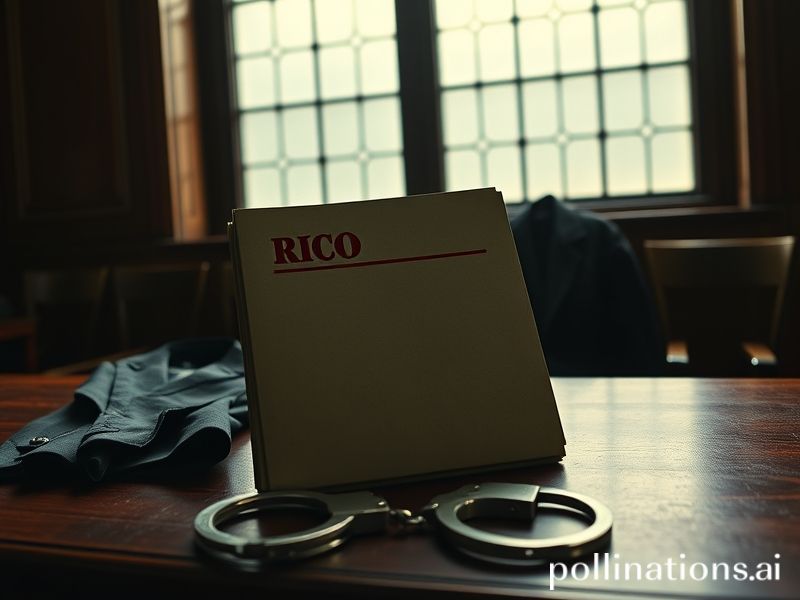RICO Goes Global: How America’s Anti-Mafia Law Became the World’s Favorite Extraterritorial Guillotine
Racketeers Without Borders: How America’s Favorite Acronym Became the World’s Favorite Weapon
The letters R-I-C-O sound like a Caribbean resort chain. In reality, they’re the legal equivalent of a drone strike: once the indictment launches, collateral damage is just the cost of doing business. Originally cooked up by the U.S. Congress in 1970 to kneecap the Mafia, the Racketeer Influenced and Corrupt Organizations Act has since gone backpacking across the planet, collecting passport stamps from Caracas to Kuala Lumpur. These days everyone wants in on the extraterritorial fun: foreign prosecutors quote it like scripture, defense lawyers quote it like a curse, and the rest of us just wonder why the acronym never caught on in Esperanto.
Globalization, that cheerful euphemism for “whatever the strongest economy feels like doing,” has been RICO’s travel agent. A cartel in Mexico uses WhatsApp servers in Dublin to launder fentanyl profits through Latvian shell companies? Congrats, that’s now a “pattern of racketeering activity” under U.S. law, because some of the emails touched a Gmail server in Mountain View. The beauty—if you’re the sort who finds beauty in jurisdictional overreach—is that RICO doesn’t care where you sip your morning espresso. It only asks whether you conspired to commit crimes that affect U.S. commerce. Given that the global economy is basically a Jenga tower glued together by U.S. dollars, the answer is almost always “yes, and thank you for the complimentary handcuffs.”
Europe, ever the etiquette coach of geopolitics, initially clutched its pearls. “We have our own perfectly adequate anti-mafia statutes,” sniffed Brussels—right up until ransomware gangs started turning Bavarian hospitals into giant paperweights. Suddenly German prosecutors were reading American indictments the way teens read leaked Harry Potter scripts. France followed suit, slipping RICO-style “association de malfaiteurs” charges into its legal briefcase, though naturally they added a wine-pairing clause. Even the UK, which still thinks jurisprudence peaked with Magna Carta, quietly borrowed the conspiracy language for its “Unexplained Wealth Orders.” Nothing says sovereignty like copying another country’s homework and re-branding it “post-Brexit innovation.”
Down south, Latin America greeted RICO with the weary familiarity of a telenovela plot twist. Governments from Colombia to Brazil have long suspected that local kingpins and multinationals share the same offshore accountant. When the U.S. Department of Justice slapped RICO charges on a Brazilian construction giant for bribing politicians across twelve countries, the region’s reaction was less “foreign interference” and more “finally, someone returned our voicemail.” Of course, populist presidents then weaponized the same statute against opposition journalists, because nothing ruins a good anti-corruption crusade like actual accountability.
Asia, meanwhile, is learning that RICO makes awkward dinner conversation. Singapore’s spotless reputation relies on laundering only the right kind of money; a U.S. indictment naming three of its banks as conduits for North Korean crypto-heists was therefore as welcome as durian on a first date. Hong Kong—half global finance hub, half geopolitical hostage—now faces the delicious irony of U.S. prosecutors accusing Chinese state-owned firms of racketeering while Beijing accuses Washington of the same via its new National Security Law. Somewhere in the afterlife, Sun Tzu is updating “The Art of War” with a chapter on subpoenas.
What does all this mean for the average citizen who still thinks RICO is a Caribbean cocktail? Simply that the thin membrane separating “legitimate commerce” from “organized crime” has become a wet tissue. Multinationals outsource pollution, governments outsource punishment, and everyone outsources morality to whichever jurisdiction asks the fewest questions first. The planet’s most successful racket isn’t drugs, oil, or counterfeit iPhones—it’s the legal fiction that national borders still matter when money and data refuse to carry passports.
Conclusion? RICO has become the Swiss Army knife of global governance: a blunt instrument that cuts through sovereignty, diplomacy, and the occasional human right. And like any good vacation souvenir, it’s coming home heavier than when it left—baggage fees payable in forfeited assets. So next time you feel the gentle tap of a U.S. extradition request on your shoulder, remember: the beach was lovely, but the bill is eternal.







